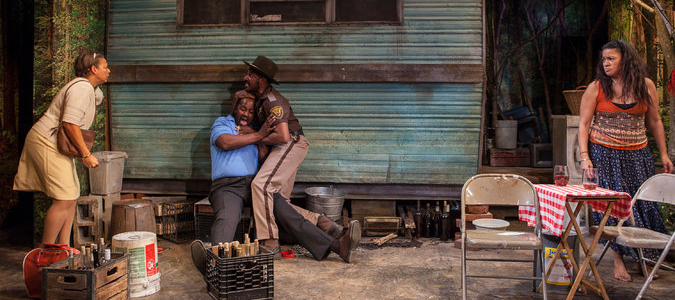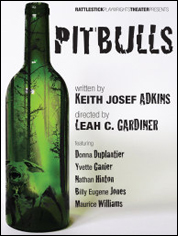

Pitbulls
Opening Night: November 7, 2014
Closing: December 13, 2014
Theater: Rattlestick Theatre
A small black community in rural Appalachia. Pitbull country. Mary and her son Dipper live in a trailer a few miles from their bible-belt, war-loving, dog-fighting neighbors. Despite being the community’s pariah, Mary is at peace making and selling wine. However, when a prize-winning pit bull is slaughtered on the Fourth of July, Mary’s solitary existence becomes suspect. Pitbulls explores what it costs to be an individual in America.
BUY TICKETSREAD THE REVIEWS:
November 21, 2014
Pitbulls, a new work by Keith Josef Adkins now playing at the Rattlestick Playwrights Theater, is a strong play by a talented, fresh writer. Set in the backwoods of Appalachia, it dives into the vicious subculture of pit bull fighting. The play centers on Mary and her son Dipper, who reside in a beat-down trailer and make their living selling their homemade wine for pennies and dimes. The town they live in is one obsessed with pit bull fights, and when a prized dog is mysteriously butchered before a big match, fingers start to point and tempers flare. A sexual heat drips over everything in the play, and violence lurks just under the skin. One of the first images placed in the audience’s mind comes from the excellent sound design by Bart Fasbender, who gives the play a particularly strong soundscape. The sound of dogs ripping one another apart clamors through the Appalachian hills, and we are forced to fill in the gruesome blank. Yet most of all, it’s the mother-son relationship that sits at the play’s heart. It’s these relationships that Mr. Adkins is interested in, rather than the brutal savagery of dog fighting. His story is one of a mother-son relationship that feels far more brother-sister in nature. Mary (the strong-willed Yvette Ganier) is an overbearing mother to Dipper (the charmingly sweet Maurice Williams), and comes across as a kind of Appalachian Ma Barker. But your heart breaks when she says simply, “All my life I wanted to be better than them.”
READ THE REVIEWNovember 21, 2014
You can say one thing for Pitbulls: It features a setting and characters rarely seen in theatre; then again, there may be a reason for that. The action unfolds in a small town near the Ohio River and, especially as rendered in Andrew Boyce’s scenic design, it is a remarkably unsanitary place. The main set is a yard in the backwoods, filled with limp, hanging laundry, stools, baskets, random cement blocks, and a washing machine. There is also the moldy-looking exterior of a trailer. This is the home of Mary, who is regarded by the town as a kind of witch, and it is alarming to think that this filthy space is where she makes the homemade wine that provides her with her tiny income. (She notes that the wine derives its distinctive taste from the little drop of her blood that she adds to each bottle.) Mary lives with her teenage son, Dipper –“I named you after a constellation,” she tells him–who sells the wine at a highway off-ramp. When Pitbulls begins, Dipper is trying to blow up a dead squirrel; caught in the act, he becomes a suspect in much bigger crimes. Mary, whose hygiene reportedly needs work, is nevertheless a kind of man magnet. Virgil, the local sheriff, tells Dipper, “Your ma was the tastiest piece of God this side of God,” but currently Mary has taken up with Wayne, who doesn’t let his job as a minister sway him from adultery and consuming pornography. Wayne, who calls his fling with Mary “an unholy diversion” and “an unsanctified detour,” justifies his behavior by saying “it is better to speak your sins than hide them.” He woos Mary by bringing her wine goblets.
READ THE REVIEWNovember 21, 2014
Lusty soap operas about the crazy ways of sneaky, unwashed hillbillies have gone missing on New York stages in recent years. In olden days, when Tobacco Road ruled Broadway in the 1930s, slick urbanites couldn’t get enough of such moonshine. But now, except for those occasions when Tracy Letts (Killer Joe) is feeling folksy and perverse, that genre has been reduced to festering on reality television. So hats off (preferably accessorized with bullet holes and grease stains) to Keith Josef Adkins, who has reclaimed this rich and odoriferous territory for the stage with Pitbulls. This resplendently foul-mouthed production at Rattlestick Playwrights Theater dares to present, as one character says, “trailer trash in its natural habitat.” That’s Virgil (Billy Eugene Jones), the mean and blackmailing sheriff, speaking to our defiant heroine, Mary (Yvette Ganier), who is the object of desire, fear and derision of many a soul in the Ohio River valley woods where she parks her rusting trailer. Mary is a maker of “real grape wine” (secret ingredient: her own blood), which she has her overgrown son, Dipper (Maurice Williams), sell to passing cars on the offramp.
READ THE REVIEW




















